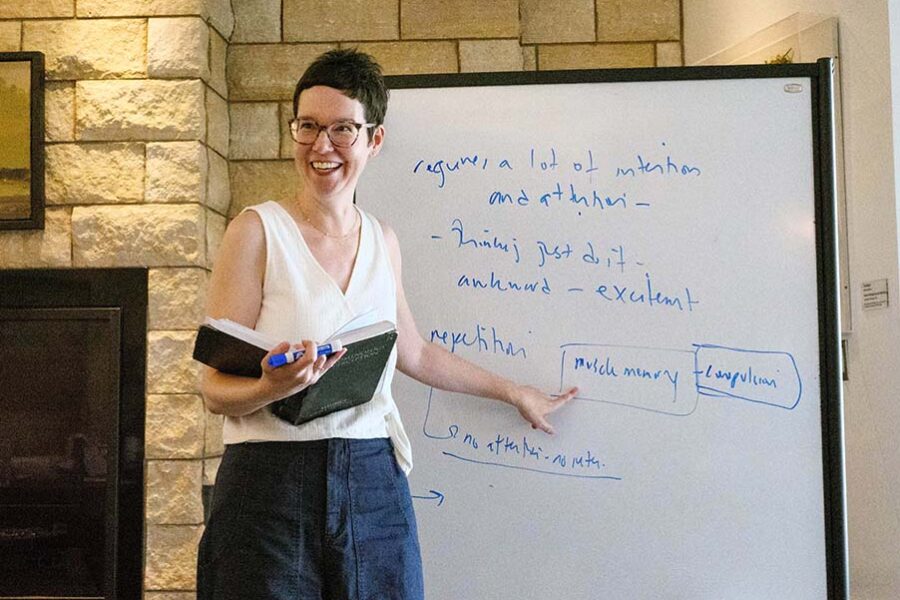For the second straight year, the UNMC College of Nursing hosted the Institute for Hermeneutic Phenomenology.
This year’s theme was “When Experience is Distressed: A Phenomenological Exploration of Mental Health and Illness.”
The four-day institute featured a visiting philosopher, group discussions and peer-reviewed presentations.
Susan Bredlau, PhD, phenomenologist and assistant professor of philosophy at the University of Maine, presented her expertise about phenomenology and the informing philosophies. Nurse phenomenologists, Roxanne Vandermause, PhD, Suzanne Dickerson, PhD, and Trish Young, PhD, led discussions and workshops that explored how phenomenology may be used in research and how it may impact attendees’ conception of and responses to mental illness.
Dr. Bredlau said the ability to share her experiences and expertise while encouraging collaboration amongst practitioners and researchers from varying backgrounds was a unique aspect of the institute.
“I like to teach philosophy in a way that is grounded in our everyday lived experience,” she said. “So being able to hear about other people’s experiences, see them engaging with the material and seeing how it connects their experience is really valuable.”
While Dr. Bredlau led the seminar, she said the institute also provided her with learning experiences.
“It’s helped me gain an awareness of how these hermeneutic phenomenological ideas are being put into practice and being integrated into research studies,” she said. “I’m also learning how some of the concepts or the ideas that we tend to take for granted in philosophy or in phenomenology can mean something very different to each person.”
Kelsey Noble, D.O., assistant professor in the Department of Internal Medicine at UNMC, said the lessons presented will help her as an instructor and practitioner, especially as she continues an interest in hermeneutic phenomenology.
“I work in quality (clinical) care and I think what’s really unique about my work is that we try to elevate and emphasize the patient’s experience; that’s my primary guidepost in how we are doing,” she said. “When I come into a room and I ask someone ‘How are you,’ or ‘How are things going,’ that is the most important thing to me. Just making that connection.”
Each day of the institute also featured research presentations that allowed attendees to present their projects for feedback. Peace Johnson, a PhD student at the UNMC College of Nursing, presented her research on the practice of spirituality in dementia patients. She said the networking opportunity and exploring how hermeneutic phenomenology can advance her research was invaluable.
“I have more knowledge about how to do this kind of analysis and, from the phenomenology standpoint, it’s a hard a concept to grasp, but that will come with time and this definitely helps,” she said, adding that just the chance to work with people with similar interests has been “worth a world of knowledge.”
Marlyn Lestage-Laforest, a PhD student at the Conway School of Nursing at the University of America, said she had begun exploring hermeneutic phenomenology for her dissertation when one of her professors informed her about the conference. What she learned at the conference, Lestage-Leforest said, will be helpful as she moves forward in her research and her career.
“I am choosing phenomenology from a hermeneutic standpoint because I want to know the people’s experiences” she said. “(The institute) will help me look at the questions I have already formulated (for my research) and see whether I can change anything, if I can make them better, more correct or emphasize what I’m trying to ask.”
About the conference
Hermeneutic phenomenology is used as a research approach that applies a particular “continental” philosophical perspective to collect and analyze data. The purpose is to understand meaning in the context of shared human experience. This often involves interviewing persons and/or examining text and can reveal overlooked or previously unseen insights or understandings.
Established in 1994 by Nancy Diekelmann, Professor Emerita at University of Wisconsin-Madison, the institute connects persons interested or experienced in phenomenology with renowned philosophers and fellow phenomenological researchers. Each year, the institute features a traveling philosopher.
